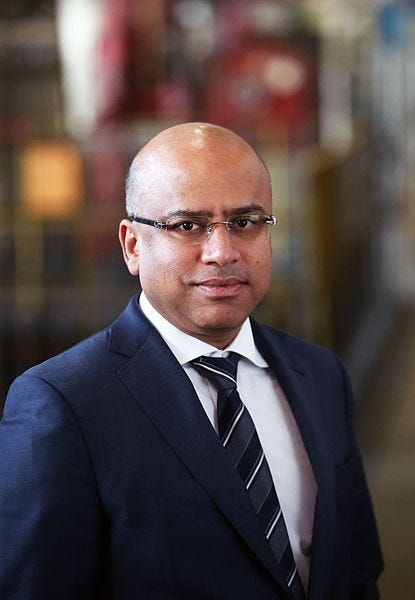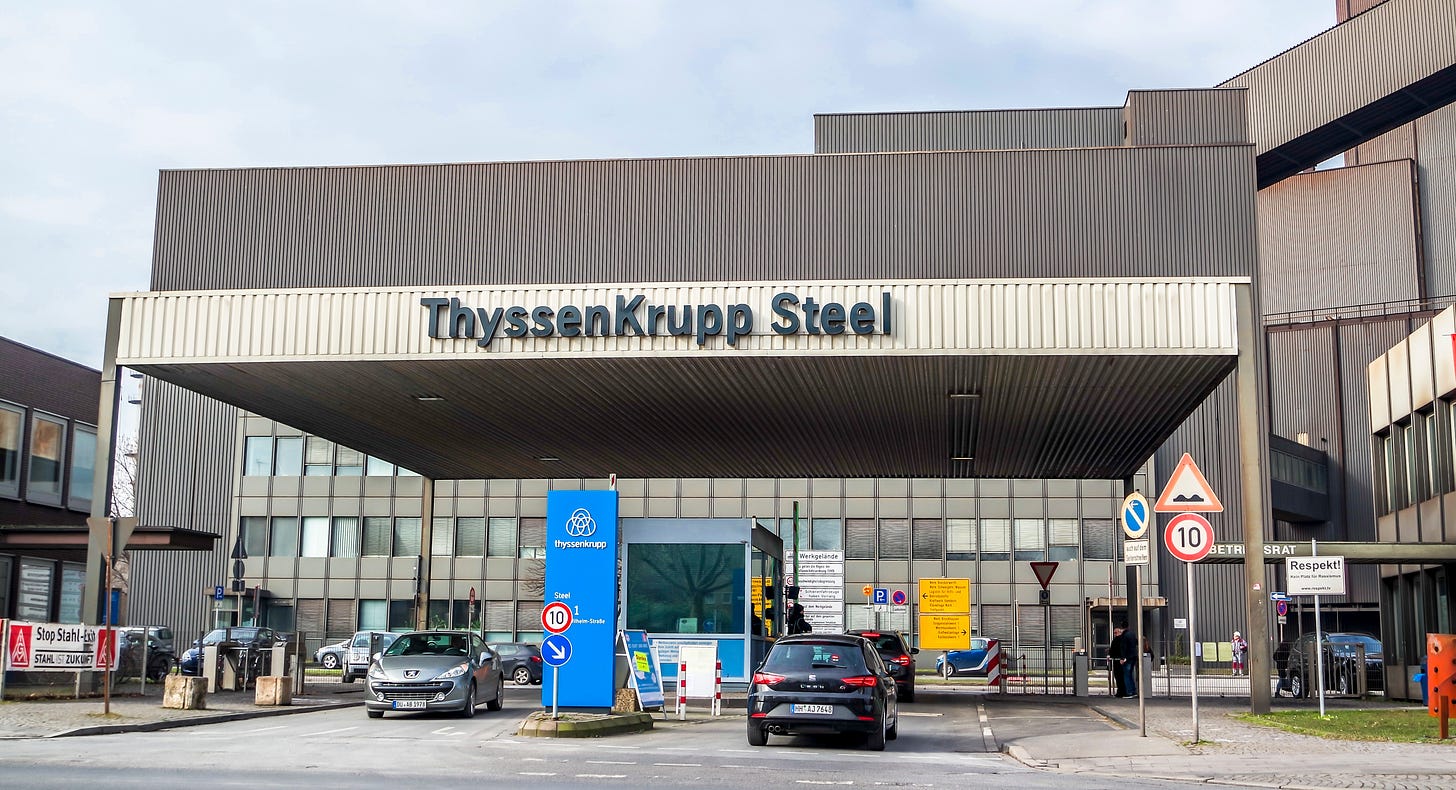Kruppstahl and the mysterious Mr Gupta
This is a 5-minute read
“Who is Sanjeev Gupta?” asked the BBC in April 2016 when the Indian-born former commodity trader came from nowhere to launch a daring bid on Tata Steel’s UK operations. By the end of the year, he was “the man who can save the British steel industry". With ferocious speed Gupta had bought and reopened steel mills, aluminum smelters, and scrap metal plants up and down the United Kingdom, saving thousands of jobs in the process.
Four years later Germany is asking the same question as Gupta’s Liberty House is the only bidder for the ailing steel operations of battered industrial icon ThyssenKrupp.
The Ruhr based company has long been the problem-child of German industry. When CEO Martina Merz took over in 2019 she was the third leader in 15 months and instead of making history as the first woman to lead a DAX30 company, her employer made the headlines for falling out of the index, which it had been part of since its inception in 1988.
Merz took the job no one in Germany’s industrial elite wanted and which was described as a poisoned chalice. The 57-year old engineer has one task - to dismantle and sell off as much as possible of the sprawling conglomerate, which consists of close to 700 subsidiaries.
Shareholders were delighted to see the back of her flip-flopping predecessor Guido Kerkhoff, who couldn’t make up his mind on what to sell, merge, or keep. And they didn’t regret their choice when Merz last year was able to flip the company’s elevator business to a private equity consortium for a whopping €17 billion.
But the industrial group, which traces its history back to a steel mill opened by Friedrich Krupp in Essen in 1811, is hemorrhaging cash and the next sale must happen soon. To the horror of the unions and local politicians, it’s the steel division, which will go on the chopping block.
ThyssenKrupp’s owners, primarily the Krupp Foundation and hedge fund Cevian, have no interest in, or ability to, continue financing the archaic blast furnace facilities, which will lose one billion Euros this year and are in need of 10 billion Euros of investments to modernize, according to the group’s own estimates. The maths just doesn’t add up.
It is rare for German politicians to interfere with cross-border acquisitions but next year is an election year and the steel division is not only a key supplier to the German automotive industry, it also employs 30,000 workers in the home state of not only all three candidates for the chairmanship of the CDU, but also of SPD chairman Norbert Walter-Borjans.
The ink on Sanjay Gupta’s offer was not even dry when Walter-Borjan raised his objection: “The steel division of ThyssenKrupp must not fall into hands that turn Germany's largest steel location into a demolition site.”
His political adversary, CDU leadership hopeful and prime-minister of North-Rhine Westphalia, Armin Laschet, was only too happy to agree.
“ThyssenKrupp belongs to the DNA of North Rhine-Westphalia, steel is systemically important and we cannot accept that we have no steel production in Germany," he had demanded a few days earlier.
The hostility is directed towards Mr Gupta and not the two other potential acquirers, Sweden’s SSAB or UK’s Tata Steel, who have not yet come with an offer.
“We are not in the running,” were the clear words of steelmaker SSAB’s boss Martin Lindqvist, who had previously indicated an interest in acquiring parts of the steel division but who is now rumoured to be in talks to acquire the Dutch operations of the third possible ThyssenKrupp suitor, Tata Steel.
Mr Gupta has a clear concept for the purchase and a track record of saving jobs in the UK. His Liberty Group is active in the production of aluminum and refined steel and is in need of the output that Thyssen Krupp’s mills produce. Hence his claim that he will not cut jobs but actually invest is plausible.
Still, the workers union IG Metall, which due to Germany’s unique Mitbestimmungsgesetz has equal voting power on the board as the shareholders, is deeply skeptical of the hitherto unknown British-Indian entrepreneur.
They have their own plan - Verstaatlichung. Mid-October 3,000 Thyssen Krupp steelworkers demonstrated outside of Armin Laschet’s office, demanding that the state step in.
"We reject any foreign acquisition. Thyssenkrupp steel does not need a new owner but capital,” said Jürgen Kerner, who sits on the steelmaker’s board for IG Metall.
Surely even the IG Metall must realize that the dream of state-owned German steel mills died with the GDR. What then is really the problem with Mr Gupta and the Liberty Steel bid?
Well, there is a fairly big one…
Long before the German press learned how to spell Sanjeev, the Financial Times had begun questioning the sustainability of the Gupta Family Group Alliance (GFG Alliance), to which Liberty Steel group belongs. In particular, the metals magnate’s financing practices and opaque reporting are under scrutiny.
Questionable financials, investigations by the Financial Times, now if that doesn’t ring a bell in the German business establishment…
Government intervention or the sell-out of 30,000 German steel-workers to a dubious owner? It’s not only Mrs Merz and her board of directors who are stuck between a rock and a hard place. IG Metall is turning up the pressure on Armin Laschet and demanding he put his money where his mouth is - if he believes that steel is in the DNA of North Rhine-Westphalia, why not invest?
As Mr Laschet is involved in a fierce battle for the chairmanship of the CDU and hopes to replace Angela Merkel as Bundeskanzler next year, the last thing he needs is a workers conflict in his home state. Yet he also has no need for a bunch of old steel mills...
A.B.B.
Like what you’re reading? German current affairs and news straight to your inbox three times a week. Subscribe here to get the Hochhaus newsletter:
Who we are:
Jörg Luyken: Journalist based in Berlin since 2014. His work has been published by German and English outlets including der Spiegel, die Welt, the Daily Telegraph and the Times. Formerly in the Middle East.
Axel Bard Bringéus: Started his career as a journalist for the leading Swedish daily Svenska Dagbladet and has spent the last decade in senior roles at Spotify and as a venture capital investor. In Berlin since 2011.




